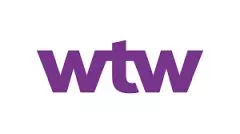- within Technology topic(s)
- in United States
- within Technology topic(s)
- in United States
Pay practices are shifting in tech, media and gaming as organizations adapt to economic, legislative and talent market developments.
Economic, technological and labor market developments are affecting pay practices across industries around the world, but the impacts being felt aren't all the same. Leveraging comprehensive WTW research as well as insights from a pulse survey among prominent tech, media and gaming (TMG) organizations globally, we were able to take a deeper dive into the latest trends this dynamic industry is experiencing.
01
Inflation concerns are easing though uncertainty remains
Persistent inflation continues to affect TMG organizations, which are striving to adapt to the new reality of operating in a high cost of living environment. Data from Oxford Economics shows that inflation is expected to ease in 2024 and the threat of recession – which has been a constant companion for many organizations since the pandemic – is beginning to subside. However, caution is needed as recent escalations in political tensions have once again started to impact the global economy reigniting inflation and energy worries, leading to warnings from some of the world's leading economists about more global uncertainty.
02
Organizations are managing their salary budgets appropriately
2023 real wage increases in core European markets (France, Germany, Italy, UK) and the US were negative, indicating that salary increases have not kept pace with inflation. In Europe, the only exception was Belgium, where automatic wage indexation is tied to inflation (see Figure 1).
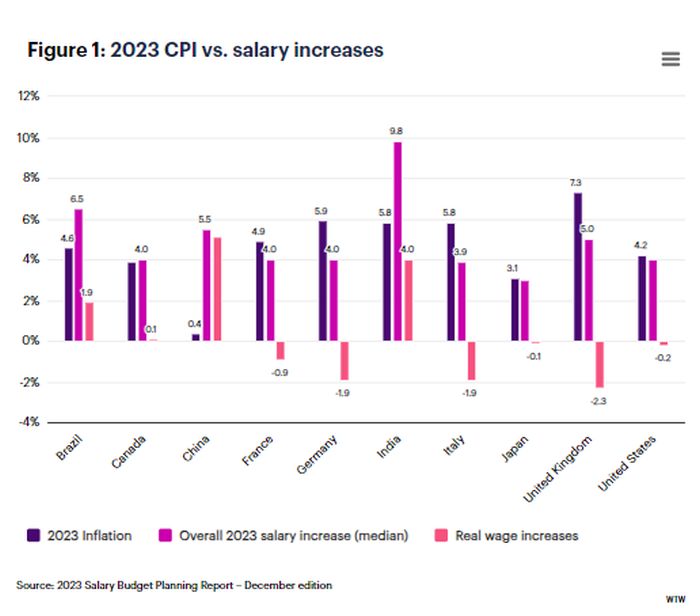
Not tying salary increases to inflation indicates a commitment by organizations to their pay philosophy. Most organizations say their pay philosophy focuses on attracting and retaining talent by paying competitively relative to a targeted competitive labor market. That is, pay is grounded in the cost of labor for employers, not in the cost of living for employees. If organizations take inflation into account as part of setting salary budgets, that is a significant departure from this pay philosophy. Organizations also consider overall company and job performance, industry and market competitiveness, and other criteria when planning salary budgets.
All of this said, organizations did take some pay actions in response to high inflation levels: 2023 actual salary budgets were the highest that has been seen in nearly two decades, according to WTW's 2023 Salary Budget Planning Report – Global (December edition). Additionally, real wage increases have been positive in China, India and Brazil, indicating that salary increases have outstripped inflation.
03
Organizations are looking at different ways to compensate employees
Though salary budgets may (and should) not be based on cost-of-living increases, TMG organizations are still taking actions to help employees cope with inflation while balancing costs and an economic slowdown. Key themes that organizations are thinking about, based on our research:
- Closer monitoring of external pressures around the globe (dramatic changes in inflation, currency fluctuations, political unrest, conflicts etc) and the potential use of discretionary increases, albeit dependent on affordability and the natural link to overall business performance
- Low earners are being prioritized for higher than usual salary increases in those markets where the rate of inflation and subsequent pressure on employees is unprecedented
- Stronger communication and education about the links (or gaps) between market pay and inflation
- Clearer communication around organizations' wider total rewards offerings rather than focusing on base pay alone
04
Salary budgets still have an important role
Among pulse survey respondents, less than half (41%) said their 2024 salary budgets will be lower than 2023, and nearly a quarter (23%) said they would be higher (see Figure 2a). 18% said they had not yet set their 2024 budgets. This shift could be linked to the expected inflation cooldown in 2024, plus an easing of historically high new-hire premiums in the past few years.
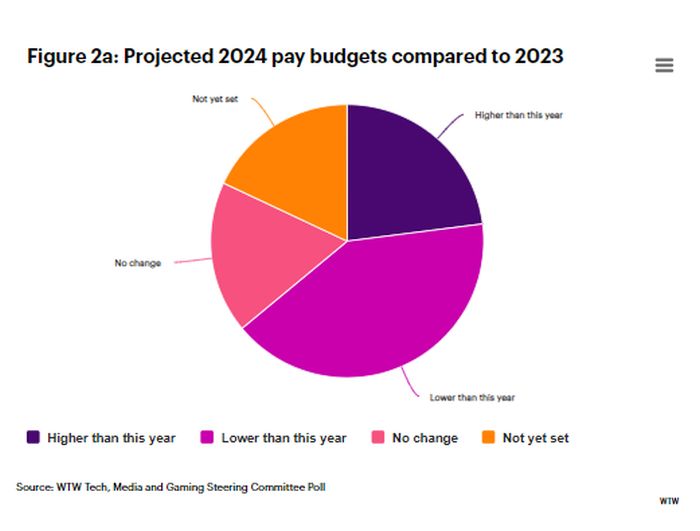
Additionally, 41% of respondents said they expect the business environment to be slightly better in 2024 than it was in 2023, while another 41% expect it to be the same. Only 18% of respondents said they anticipate a slowdown, indicating optimism among TMG organizations (see Figure 2b).
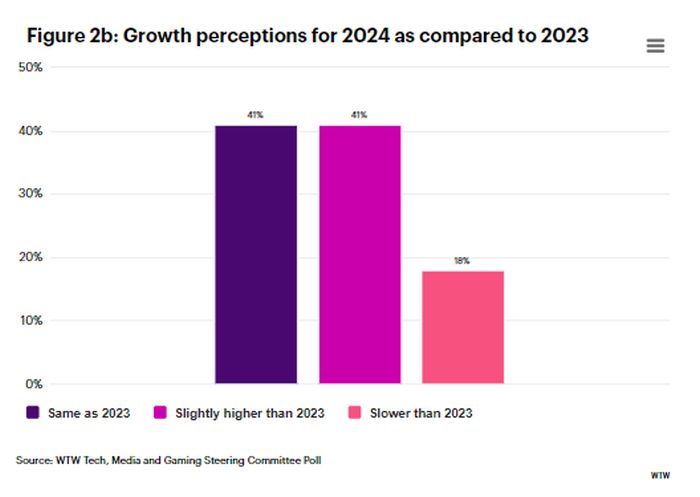
05
Tech roles are prioritized over non-tech roles
Regarding 2023 staffing actions among TMG organizations, about one-quarter of respondents implemented more layoffs and hiring freezes among non-tech roles vs. tech roles (see Figure 3). Most organizations are still carefully reviewing their workforce and workforce needs before replacing any roles, regardless of whether they are tech or non-tech.
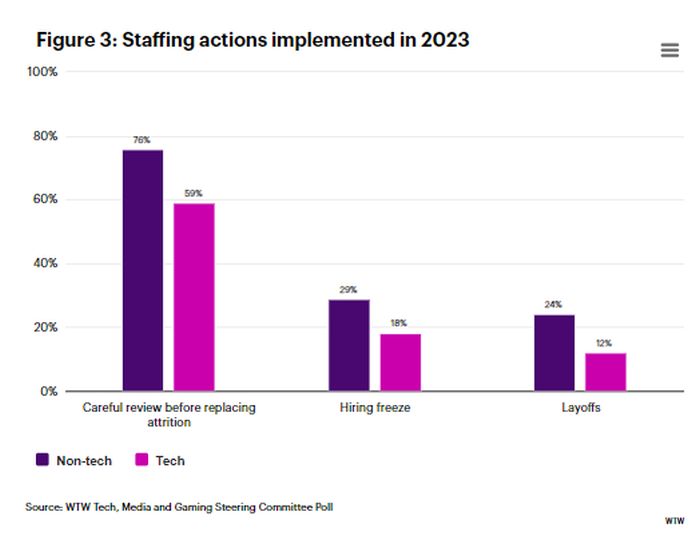
06
Competition for talent is easing
Though attraction and retention issues are still a challenge among TMG organizations, it appears that fewer organizations are concerned about the competition for talent as compared to 2022. In general, concerns about the competition for talent may further decline in 2024, though we expect to see this pressure remain for certain jobs and skill sets that continue to be in high demand, such as IT and digital talent.
07
Tech roles are dominating the highest-paying jobs
Related to continuing competition for talent, technology-related roles tend to dominate the top three highest paying jobs in the 10 largest economies (see Figure 4). Roles in AI and big data (e.g., AI applications, machine learning, data and algorithm engineering) are some of the highest paid jobs in the US, Canada, Brazil and China. Meanwhile, developer roles tend to be in demand in Japan, Germany and Canada. In France and China, roles in cloud computing architecture and systems architecture top the list.
Figure 4. Top three paying jobs across the 10 largest economies, ranked by pay
| Location | First | Second | Third |
|---|---|---|---|
| Brazil | Machine Learning | Medical Services – Medical Doctor | Tech Product Development |
| Canada | IS and Cyber Security Development | Data Engineering | Research Generalist/Multidiscipline |
| China (Beijing) | Journalism – Writing/Reporting | Systems Architecture | Algorithm Engineering |
| France | Strategic Alliances | Cloud Computing Architecture | General Operations Management (Nonmanufacturing) |
| Germany | Government Relations | Application-specific Integrated Circuit | IT Performance Management |
| India | Media Production Creative Design | Software Generalist/Multidiscipline | Research Generalist/Multidiscipline |
| Italy | Journalism – Writing/Reporting News | Customer Success Management | Customer Success Management |
| Japan | User Experience Design | Technology/Systems Consulting | Technology Product Development |
| United Kingdom | Mergers and Acquisitions | Technology Product Manager Generalist/Multidiscipline | Front-End Development |
| United States | Artificial Intelligence (AI) Applications | Legal Generalist/Multidiscipline | Mobile Application Development |
Top three jobs ranked by pay across the 10 largest economies Source: WTW 2023 Tech, Media and Gaming Compensation Survey (based on median total guaranteed compensation - P3 career professional level)
08
TMG organizations are competing across industries for talent
Organizations are focused on in-demand tech and digital skills when thinking about their compensation spend, according to WTW's Talent Intelligence Reports, and this is true across all industries, not just in the TMG sector.
Software engineers and application developers are in high demand, as well as talent with skills in sales and account management (see Figure 5). Other in-demand jobs span multiple areas, including data, consulting, product and engineering. Contrary to widely published stories about tech layoffs, we see that organizations are still adding to their headcount despite this, but with an emphasis on jobs that will support growth. Additionally, technology firms are aiming to maximize generative AI, including persistently recruiting for data scientists and data engineers, as well as the growing demand for AI engineers.
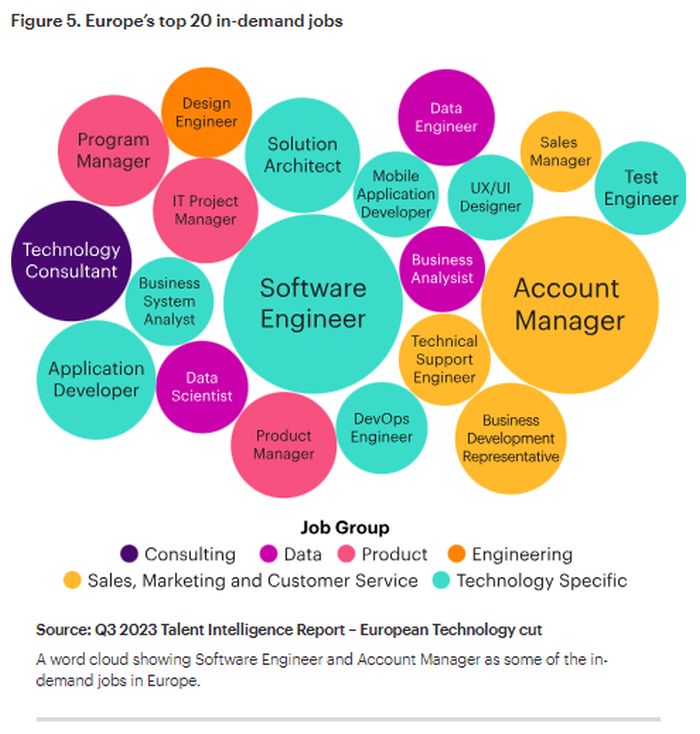
09
The role of pay premiums
Hiring can be costly, especially when pay premiums come into play. An analysis of pay premiums between incumbents who have been in place for more than a year compared to those who had been in their roles for less than a year revealed that pay premiums have increased in certain key markets, including the US, France and China (see Figure 6).
Figure 6. New-hire pay premiums across key markets
| Professional Level | Brazil | China (Beijing) | France | United Kingdom | United States |
|---|---|---|---|---|---|
| P2 | 2% | 8% | -8% | -4% | 5% |
| P3 | 2% | 11% | -6% | 6% | 4% |
| P4 | -2% | 20% | 2% | 6% | 4% |
| P5 | -1% | 10% | 9% | 5% | 3% |
| P6 | -16% | 32% | 12% | 5% | 2% |
Pay premiums given to new hires across key market Source: WTW 2023 Tech, Media and Gaming Compensation Surveys, total guaranteed compensation average, new hires vs. existing hires.
China continues to be a dynamic market, with Beijing leading the pack, with pay premiums for new hires reaching 20%. Meanwhile, US pay premiums were 4% and in France they were 3%; those premiums reflected increases compared to 2022 for both countries. In the UK, premiums declined slightly, and in Brazil there were no real pay premiums for new hires.
These findings indicate that new-hire premiums are still common for driving talent attraction but may be cooling compared to the past few years. Additionally, employers are concerned about internal equity issues and how to manage them.
10
Unexpected functions receiving pay premiums
While organizations are looking closely at how they spend pay premiums, some functions in the market are calling for higher-than-average premiums (see Figure 7). In our comparison of P3 career level incumbents who have been in the role for less than one year versus those hired more than a year ago in the TMG industry, there are some usual and expected suspects: cyber security and product development, for example. However, premiums for support-type functions, such as technical customer support, contact center, sales and legal support and customer success are emerging. This indicates that organizations also are investing in an enhanced client experience and want to ensure they have the best talent to accomplish this.
Figure 7. Disciplines with highest new hire premiums
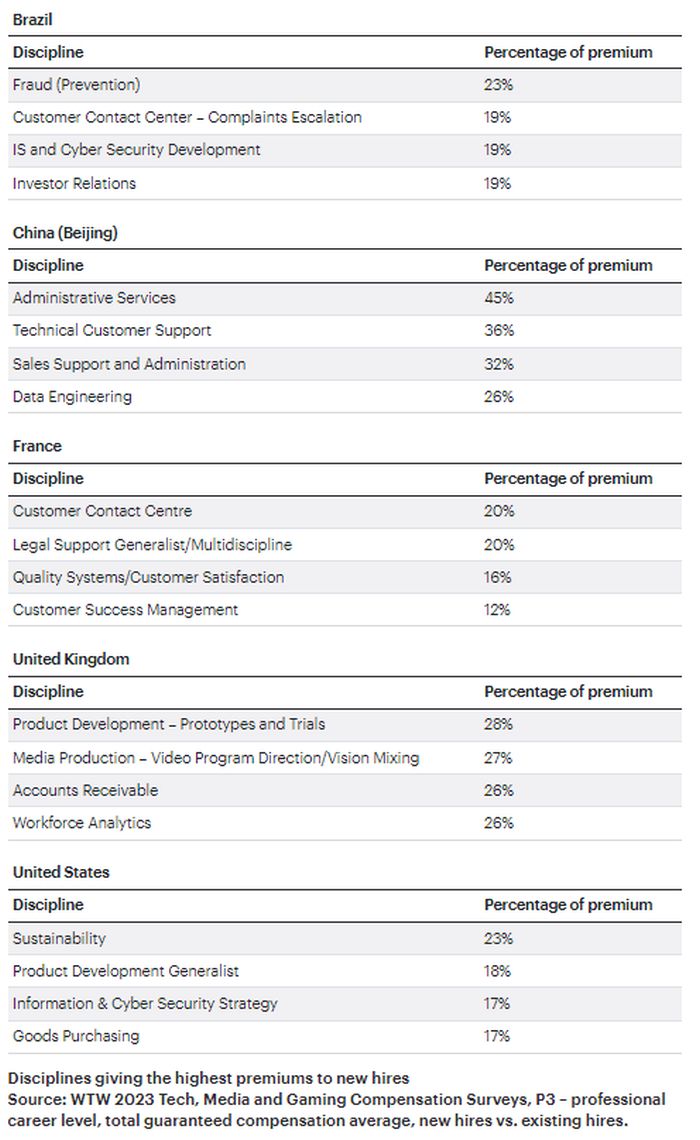
In the US, sustainability functions are receiving new-hire premiums due to a stronger focus on environmental, social and governance (ESG) objectives, climate commitments and relevant policies. The field of sustainability does not appear to have a full talent pipeline, hence premiums to entice needed talent.
11
Pay transparency is demanding attention
Along with internal equity, pay transparency is another major pay-related development that organizations in every industry must prepare for. Legislation on fair and equal pay is steadily progressing across the European Union and United States as well as in other countries. Organizations must prepare for these legislative changes to maintain their compliance and competitiveness in key markets around the world.
12
There is a stronger focus on total rewards
As inflation, tight labor markets and pay premiums are adding pressure to increase base pay, TMG organizations are putting a stronger focus on their total rewards offering. Additionally, initiatives are being launched to enhance total rewards programs and packages via:
- A wider and more complex rewards portfolio
- Programs and practices that have a greater connection to employee wellbeing and business performance
- Higher levels of business and HR engagement in program development and communication
TMG organizations are leaning on AI to support and streamline rewards processes by:
- Accelerating the drafting of job descriptions, reports and policies
- Aggregating market data
- Designing communication and training materials
- Supporting the identification of errors within data by recognizing trends and patterns
- Powering increasingly useful chatbots to provide real-time responses to frequently asked questions
- Enabling deep data mining for personalized and individualized rewards
In an examination of emerging skills there is a strong link supporting this evolution of the total rewards function:
Top 10 prevalent skills
- Data analysis
- Stakeholder management
- Compensation design
- Market benchmarking
- Communication development
- Job evaluation
- Policy development
- Regulatory compliance
- Performance management
- Talent management
Top 10 emerging skills
- Strategy development
- Data visualization
- Business partnering
- Storytelling
- Data modelling/analytics
- Process automation
- Measurement
- Design thinking
- Insights
- Change management
Focus for 2024
These trends demonstrate that TMG organizations are taking a renewed approach toward compensation to ensure they are attracting and retaining in-demand talent and skills. Although pay premiums are still common, sector organizations are exploring ways to strengthen their total rewards function that will help them retain the right people in the right roles while effectively overcoming the challenges of persistent inflation and a tight competition for talent.
The evolving pay landscape in the TMG industry demands agility, strategic foresight and a strong focus on total rewards to attract, retain and nurture talent while weathering economic fluctuations. As the industry charts its course, adapting to these trends remains crucial for sustainable growth and resilience.
To view the full article click here
The content of this article is intended to provide a general guide to the subject matter. Specialist advice should be sought about your specific circumstances.

